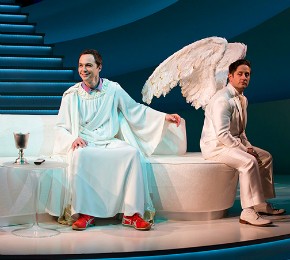Religious satire on Broadway

God is the new star on Broadway. In two recent plays, David Javerbaum’s An Act of God and Robert Askins’s Hand to God, God clearly has something to say. But what is it?
In a first for a Broadway play, An Act of God started as the Twitter account @TweetsofGod. Tweeter David Javerbaum personifies God as a cranky omniscient father frustrated by the irresponsible behavior of his children. The tweets are mostly funny, in a cheeky and politically left way. (“I know I should stop appearing in Republicans’ dreams and saying ‘I command thee to run for President!’ but dammit, it’s so friggin’ fun.”) They are sometimes theologically provocative: “If you think atheism promotes a lack of moral responsibility, you should see what happens when my son takes the blame for all your sins.” Each tweet nails the genre: a momentary insight or a witty joke—and then done.
As a Broadway play the joke stretches thin. God appears in human form, with Jim Parsons playing more or less the same character he plays in The Big Bang Theory, but now possessed by the Deity. He delivers the tweets amidst interspersed exposition. Javerbaum has more time to kill with the play, but adds no richness or complexity. Islam is dispatched with a witty one-liner; Jesus is a plot device advancing the not-so-subtle message of the play. And that is this: God is a screwed-up narcissist who gets off on playing high-stakes games with his creation. The play is not much more sophisticated than a freshman essay in a philosophy of religion class. Its God is a reductive caricature that anyone with exposure to Judaism, Islam, or Christianity will recognize.
Read our latest issue or browse back issues.
While An Act of God falls flat because it isn’t at home with the genre of stage drama, Hand to God is so at home in the genre that it can afford to cut loose. Most of the play unfolds in a Lutheran church somewhere in the U.S. South. The hand referred to in the title belongs to a teenage boy named Jason who may or may not be possessed by the devil in the form of a sock puppet, Tyrone. Where Jason is mild, polite, and subservient to a fault, Tyrone is sex-crazed, foul-mouthed, and violent. No one, not even Jason, knows whether Tyrone is the manifestation of Jason’s dark side or something even darker. The play skirts this question and focuses instead on the human dramas unfolding among the churchpeople who confront Tyrone and end up facing their own demons of grief, loneliness, frustration, and miscommunication.
Askins understands religion’s power to give shape and meaning to life in the midst of confusion and despair, and he understands religion’s human dimensions.
Hand to God is uproariously, filthily, and darkly hilarious and thrives on beautiful stagecraft and excellent writing. As it turns out, sock puppets make very convincing theater (at least when played by talented actor Steven Moyer). At the beginning and end of the play, however, Askins can’t resist offering his armchair anthropology about the origins of religion in a monologue delivered by Tyrone. While it’s a superior play to An Act of God in every way, Hand to God’s theology is no better. Watching it is like reading a history of human religion written by a high school student who’s read a little René Girard and just watched The Exorcist.
The two plays are united by a willingness to make fun of religion, to expose its (supposedly) base origins, and to mock the earnest humans trapped in their fumbling pre-Enlightenment belief system. Both plays take a page from The Book of Mormon, which demonstrated that people will pay (up to $450) to see religion treated with irreverence, satire, and irony.
This style of humor is not new to American popular culture. The creators of The Book of Mormon made it common fare in South Park. Lewis Black embodies it in every Daily Show appearance. The Simpsons alludes to it in the antagonism between Homer and Ned Flanders.
But the humor is new to Broadway, and that’s worth paying attention to. With tickets averaging $150, producers and theater companies are loath to take a risk on anything that might not sell. But these plays sell: what once was an edgy form of humor celebrated only by rebellious teens is now attracting ticket-buying adults.
The theologian in me winced at every reductive generalization. But laughter can also be a purgative. Since the Enlightenment we’ve asked ourselves, “What is religion, and what is it for?” Belief in God, which once seemed obvious, seems strange. Faith has become a burden to carry through the modern world, an irrational holdover from premodern times instead of part of the ordinary fabric of life.
Maybe that burden is being lifted by satire and irony. But what both plays miss is how a life of faith can weave a witness to justice, a commitment to beauty, and the joy of community into everyday life. Perhaps the gospel will get a better hearing in the silence after the laughter dies down.






